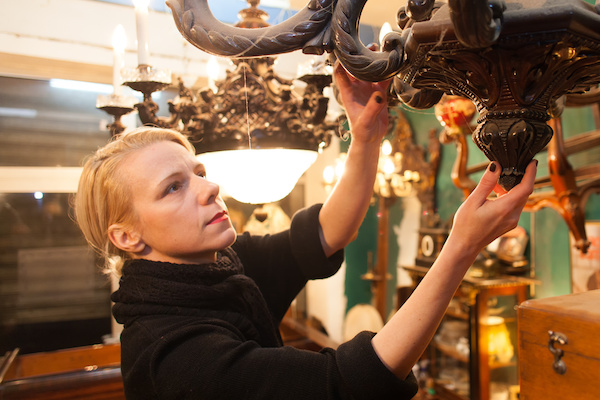How to get rid of all that stuff
By Nancy Conroy
You agreed many years ago to be the executor of someone’s estate. Perhaps your parents, an elderly relative, or a good friend asked you to take on the role. Most people will oblige without having the faintest idea of what’s in store.
Then the day comes when you are required to implement the terms of the Will. This is the moment when you discover what a significant task you have taken on. This responsibility will involve a great deal of paperwork, but sometimes the most difficult and time-consuming task is deciding what to do with the belongings now left behind. When people pass away, there is a good chance the estate is going to include an apartment or house full of memories and, in some cases, a ton of stuff.
I have friends who were the executors for an elderly friend. Upon her death, they had two months to empty her large rental apartment, which was full to the rafters with stuff, both valuable and otherwise.This daunting and stressful task was accomplished in a series of stages and, with the help of several professionals, they got the job done.
If you are an executor, liquidating the contents of the person’s home may be the most difficult part of the process.The good news is, there are professionals who will be more than happy to help you in meeting the challenge. Doing so will entail a cost to the estate, but in the end it will make the liquidation process run fairly and smoothly. My parents passed away within four months of one another. At the time, they were living in my mother’s childhood home. It had been in the family for more than 100 years.There is no question the required paperwork was considerable in settling their estate. It was completed with helpful advice from our lawyer and the funeral home. Going through every item in the house, however, was a much more personal, challenging, and time-consuming task, made more difficult because there seemed to be no rhyme or reason to their storage choices. Everything had to be sifted through carefully.This involved a considerable time commitment, but I wanted to make sure we didn’t toss out anything of value or sentiment.
What options will you have when you find yourself in this situation? What steps can you take to make the disposition process as easy as possible? Here are some ideas:
Beneficiaries. Often,the first step is to determine what objects will be retained by the family. If you are lucky, the Will may contain specific bequests, or there may be a list of items identifying who should get what. Unfortunately,this often hasn’t been done,leaving the difficult task to you, the executor. If the Will simply states all of the contents of the home have been assigned to the beneficiaries, you will need to determine what objects are of interest to the beneficiaries. These need to be identified and set aside. Once objects that have clearly been left in the Will to specific individuals are dispersed, holding an informal auction with all beneficiaries present is helpful.All of these objects are gathered and beneficiaries bid on the specific items they want to obtain. All proceeds go into the estate account to be shared once the estate has been completely liquidated.
Beneficiaries not interested. There will usually be a huge amount of stuff no one in the family wants. Some of these items may turn out to be valuable and others may not. The danger at this stage is it’s tempting to call what is left ‘junk’ and just send it all to the garbage dump. Rather than taking the easy route, it’s advisable to attempt to identify which objects are valu- able and which are not.You may be knowledgeable enough to identify valuable jewellery,sterling silver,or high-end decorative objects, or you may know someone who is an expert in that field. Doing an initial sort is a good place to start.
Selling the valuable items. Once you have separated the contents of the estate into valuable and not so valuable items, you are then ready to implement a three-stage plan.The first step involves committing the most valuable objects to an auction house. Auctioneers generally have considerable training in confirming what is valuable, cataloguing it, and even providing formal appraisals.They may spy items in the estate you thought were not valuable. Their services obviously come at a price, but this price will include all of the services mentioned above as well as packing up all auction items, transporting them to the auction house, and arranging for their sale at auction.This can save you a considerable amount of time. In some instances, you may want to pay for the services of an appraiser (who isn’t with the auction house), as you may decide to try to sell some of these objects by yourself.
Dealing with the not-so-valuable items.The next step is to hire an estate sale specialist.Their services will include organizing and pricing all remaining items in order to offer them at an estate or contents sale at the home.They will advertise the sale, handle all transactions, and take charge of the sale itself. These sales usually take place over a couple of days. Again, this service comes at a price, but it will save you a huge amount of time.
The leftovers. Now it’s time to get rid of what remains in the home. Some items may be packed up and delivered to a resale charity or company. Some will be suitable for garbage pickup. Keep in mind if you use the services of an estate sale specialist, they will, for a price, implement these steps and even clean the home once everything has been removed.
Agreeing to be an executor is a generous gesture greatly appreciated by loved ones. Carrying out the duties of an executor can be daunting.
Take advantage of the services of the many professionals who can assist you in accomplishing the liquidation of an estate. n
NOTE TO READERS:THE VIEWS OF THE AUTHOR DO NOT NECESSARILY REFLECT THOSE OF COYLE PUBLISHING.THIS ARTICLE IS PROVIDED AS A GENERAL SOURCE OF INFORMATION ONLY AND SHOULD NOT BE CONSIDERED TO BE PERSONAL INVESTMENT OR LEGAL ADVICE, OR A SOLICITATION TO BUY SERVICES. READERS SHOULD CONSULT WITH THEIR FINANCIAL OR LEGAL ADVISOR TO ENSURE IT IS SUITABLE FOR THEIR CIRCUMSTANCES.

Today’s Market
Sterling silver is valuable; silver plate is not.
Antique furniture is NOT in demand; it won’t bring much.
Retro and mid-century items are currently trendy and may have value.
Ceramics and glassware may be valuable, but must be in perfect condition.
Selling Objects Yourself
Well-known auction houses, like Christie’s and Sotheby’s, hold specialty auctions for high- end objects.There is a price for this service, of course.
eBay is an option.This often involves the need to pack and ship objects.The buyer pays this cost.
Using Kijiji can be very effective, especially if you find a local buyer.
Using an online auction service like MaxSold is also an option.
Consignment to an antique store is a possi- bility, but be aware that the store will usually charge about 50 per cent of the selling price of the object.







